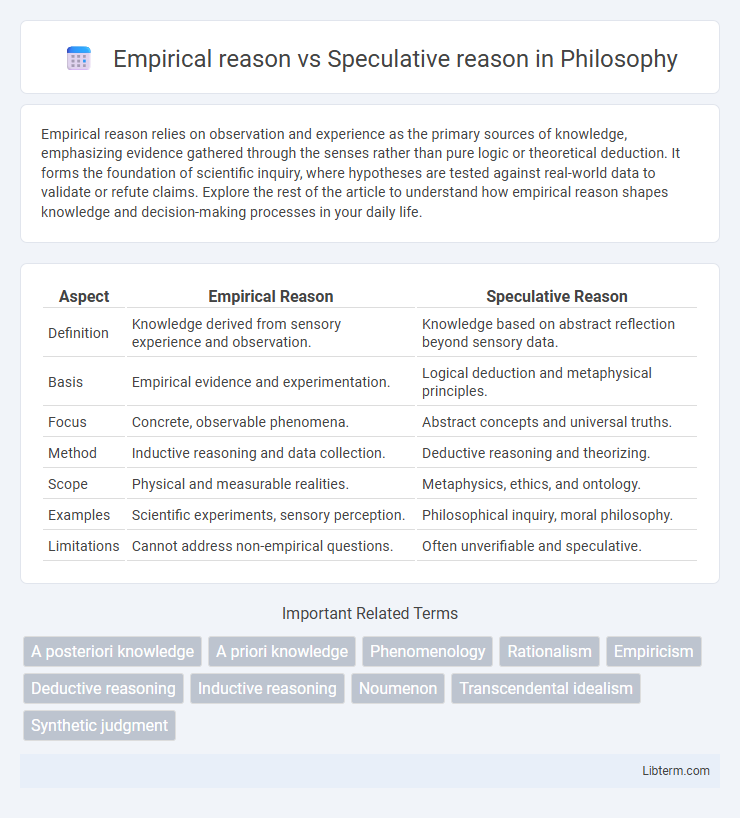Empirical reason relies on observation and experience as the primary sources of knowledge, emphasizing evidence gathered through the senses rather than pure logic or theoretical deduction. It forms the foundation of scientific inquiry, where hypotheses are tested against real-world data to validate or refute claims. Explore the rest of the article to understand how empirical reason shapes knowledge and decision-making processes in your daily life.
Table of Comparison
| Aspect | Empirical Reason | Speculative Reason |
|---|---|---|
| Definition | Knowledge derived from sensory experience and observation. | Knowledge based on abstract reflection beyond sensory data. |
| Basis | Empirical evidence and experimentation. | Logical deduction and metaphysical principles. |
| Focus | Concrete, observable phenomena. | Abstract concepts and universal truths. |
| Method | Inductive reasoning and data collection. | Deductive reasoning and theorizing. |
| Scope | Physical and measurable realities. | Metaphysics, ethics, and ontology. |
| Examples | Scientific experiments, sensory perception. | Philosophical inquiry, moral philosophy. |
| Limitations | Cannot address non-empirical questions. | Often unverifiable and speculative. |
Understanding Empirical Reason
Empirical reason relies on observation and sensory experience as the foundation for knowledge, emphasizing evidence gathered through experimentation and direct interaction with the environment. It prioritizes data verification and practical application to form conclusions that are contingent on real-world phenomena. Understanding empirical reason involves recognizing its role in scientific methods, where hypotheses must be tested against observable results to ensure reliability and validity.
What is Speculative Reason?
Speculative reason refers to the intellectual capacity to engage in abstract thinking and theoretical contemplation beyond immediate sensory experience, seeking to understand universal principles and metaphysical truths. It contrasts with empirical reason, which bases knowledge on observation and experience, by prioritizing deductive reasoning and conceptual analysis. Philosophers like Kant emphasize speculative reason's role in exploring ideas such as causality, existence, and the nature of reality.
Historical Origins of Empirical and Speculative Reason
Empirical reason originated in ancient Greek philosophy with Aristotle's emphasis on observation and experience as the foundation of knowledge, contrasting with speculative reason, which traces back to Plato's focus on abstract, a priori knowledge independent of sensory experience. The development of empirical reasoning was further solidified during the Scientific Revolution by figures such as Francis Bacon and John Locke, who advocated for inductive methods and sensory data verification. Speculative reason evolved within metaphysical traditions seeking to understand universal truths through rational deduction, influencing medieval scholasticism and later Kantian philosophy that distinguished between phenomena and noumena.
Key Philosophers in the Debate
Immanuel Kant's critical philosophy distinguishes empirical reason, grounded in sensory experience and observation, from speculative reason, which concerns metaphysical principles beyond empirical verification. David Hume, a central figure in empirical skepticism, argued that knowledge derives from sensory impressions and experience, challenging speculative metaphysics. G.W.F. Hegel, meanwhile, advanced speculative reason's role in comprehending absolute reality, asserting that dialectical logic transcends empirical constraints to achieve philosophical synthesis.
Methodologies: Observation vs Intuition
Empirical reason relies on systematic observation, experimentation, and sensory data to derive conclusions, emphasizing evidence-based methodologies in scientific inquiry. Speculative reason depends on intuition, abstract thinking, and rational reflection, often exploring concepts beyond immediate empirical validation. The methodological contrast centers on empirical reason's dependence on measurable phenomena versus speculative reason's focus on a priori knowledge and logical deduction.
Role in Scientific Inquiry
Empirical reason plays a crucial role in scientific inquiry by grounding hypotheses and theories in observable and measurable data, enabling validation through experimentation and observation. Speculative reason, while important for generating hypotheses and conceptual frameworks, relies on logical deduction and inference rather than direct empirical evidence. The scientific method primarily depends on empirical reason to test and refine ideas, ensuring that conclusions are based on reproducible and verifiable phenomena.
Influence on Metaphysics and Epistemology
Empirical reason grounds knowledge in sensory experience, significantly shaping epistemology by emphasizing observation and experimentation as sources of valid knowledge, thereby limiting metaphysical claims to phenomena accessible through experience. Speculative reason, in contrast, extends beyond empirical data to infer truths about unobservable entities and principles, influencing metaphysics by promoting abstract theorization about existence, causality, and the nature of reality. The tension between empirical and speculative reason drives foundational debates in philosophy, balancing concrete evidence with conceptual speculation in the pursuit of understanding knowledge and being.
Strengths and Limitations of Empirical Reason
Empirical reason excels in providing knowledge based on observation, experimentation, and sensory experience, making it highly reliable for understanding the natural world and validating hypotheses through evidence. Its strength lies in generating practical, testable, and falsifiable conclusions that drive scientific progress and technological innovation. However, empirical reason is limited by its dependence on sensory data, which may be incomplete or prone to error, and it struggles to address metaphysical questions or abstract concepts beyond measurable phenomena.
Critiques of Speculative Reason
Critiques of speculative reason emphasize its reliance on abstract principles without empirical verification, often leading to metaphysical assumptions that cannot be substantiated through observable evidence. Immanuel Kant, in his "Critique of Pure Reason," argues that speculative reason attempts to extend knowledge beyond possible experience, resulting in contradictions and antinomies that undermine its validity. This critique highlights the limitations of speculative reason in producing certain knowledge, in contrast to empirical reason, which grounds understanding in sensory experience and scientific methodology.
Bridging Empirical and Speculative Approaches
Empirical reason relies on observation and sensory experience to derive knowledge, while speculative reason involves abstract thinking and theoretical inference beyond direct evidence. Bridging empirical and speculative approaches enables a comprehensive understanding by integrating concrete data with conceptual frameworks, enhancing both practical application and philosophical insight. This synthesis fosters more robust interpretations in fields like science, philosophy, and epistemology, where empirical findings inform speculative theories and vice versa.
Empirical reason Infographic

 libterm.com
libterm.com